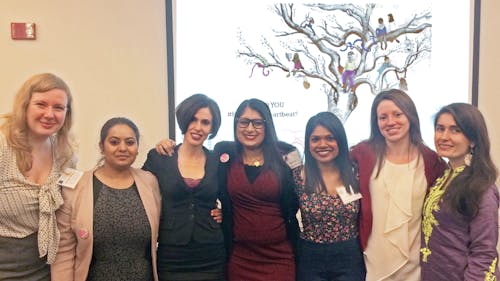Performers, speakers shed light on forced marriage

While arranged and forced marriages are generally considered practices of the past, a presentation at the Institute for Women’s Leadership last night showed they are still present in American culture.
The fourth installment of “Honoring Our Heartbeats: A Tour to End Forced Marriage in the U.S.,” which took place yesterday at the Institute for Women’s Leadership, incorporated two short films, a skit performance and an open panel discussion to talk about forced marriages and similar forms of domestic abuse.
The presentation’s content centered around “Heartbeats: The IZZAT Project,” a comic book produced by the Pomegranate Tree Group, a collection of young South Asian women who have experienced arranged marriages, forced marriages and various other forms of domestic violence or abuse.
Kathana Ratnakara, performer with the Pomegranate Tree Group and a contributor to “Heartbeats,” said the purpose of the tour is to raise awareness and incite change in the world’s patriarchal mindset.
“The culture is patriarchy. It’s the lack of respect people have for women’s right to choose,” she said. “We see all these stories of violence against women in the media, forced marriage is just an extreme version of a whole spectrum of violence against women.”
In order to create a sense of freedom with survivors at Pomegranate Tree, the comic book’s illustrations, poetry and prose incorporated symbolic imagery with birds.
“Birds are symbolic of freedom, which is pretty much the aim of every story,” Ratnakara said. “We want the freedom to choose. We want the freedom to express ourselves, ... [and] we don’t need to be policed by anybody.”
Also playing upon the bird imagery, the screening of “Caged,” a film that was adapted from parts of the comic book, illustrated birds being caged, as well as the metaphorical caging of women in societies where arranged or forced marriages are customary.
Farrah Khan, co-director of Pomegranate Tree, said being caged could be observed in American society where “young, ‘racialized’ women” are bound by forces such as racism and sexism.
Keeping with the topic of arranged or forced marriages, Ratnakara cited the concept of “shotgun weddings,” where pregnant women are pressured to marry the father of their child in various nations, including the United States.
“What we think about as freedom can shift and change because of our access,” Khan said.
Along with Pomegranate Tree, the Tahirih Justice Center, an organization that serves immigrant women and girls avoiding domestic violence, was heavily involved in last night’s discussion.
Heather Heiman, Forced Marriage Initiative project manager and senior public policy attorney at Tahirih, encouraged audience members to sign a petition on change.org that calls for national plan of action against forced marriage.
Since the latest performance of “Heartbeats” in San Francisco last month, the petition is quickly approaching 4,000 signatures.
“We need to be addressing this issue in this country,” she said. “We need to make sure that programs for survivors and victims have funding and resources that they need to move forward with their extraordinary work.”
Although bystander intervention was cited as an important practice for the well being of domestically abused women, the notion of having survivors speak out themselves was also heavily encouraged during the presentation.
Claiming that fellow survivors sometimes cannot understand the experiences of other survivors, Ratnakara said it is still important for survivors themselves to tell their stories.
Chenthoori Malan, performer for Pomegranate Tree, said expressing their experience through artistic means gives survivors a greater degree of control.
“[There is an] idea around ‘savior-ship’ and what [that means] when outside intervention comes and tries to save us,” she said. “As survivors or as ‘artivists,’ we get to choose how we want to go about this process of healing.”
Even though many of the women at Pomegranate Tree have experienced moments of feeling powerless, Malan and Ratnakara said being able to discuss their circumstances enables them to take control of something as powerful as their respective stories.
Introducing the concept of “artivism,” Malan said activism with artistic expression is one of the most effective tools for inciting change because it is both available and healing.
“Artivism is one of the most powerful tools because it’s so accessible … [art] is [a] thing that I can control,” she said. “Art is one of the most therapeutic ways of healing.”
If you or someone you know is facing or trying to leave a forced marriage, please contact the Tahirih Justice Center’s Forced Marriage Initiative (FMI@tahirih.org or 571-282-6161) for referrals to an advocate in your local area who can help; or if you are in New Jersey, please contact Unchained at Last or Manavi.
Editor's Note: The Tahirih Justice Center's change.org petition calls for a national plan of action against forced marriage, not arranged marriage.



